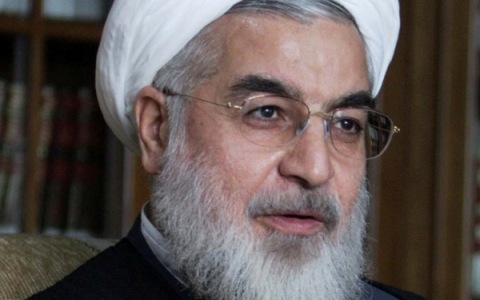‘Systematic persecution’ of Iran’s minorities continues under Rouhani
by - 11th March 2015

HOPES that Iran’s persecution of minorities would diminish under President Hassan Rouhani have been dashed, according to a report released yesterday by the APPG for International Freedom of Religion or Belief.
‘The Persecution of Christians in Iran’ report found that persecution had not diminished since the supposedly reformist Hassan Rouhani was elected to power in August 2013.
The report says there has been 'continuing systematic persecution and discrimination' against religious minorities in Iran during the first 18 months of Rouhani's term.
The MPs and peers report also found 'severe physical and psychological torture' was continuing.
‘The most severe abuse is faced by Christians who have converted from a Muslim background, and those who engage in ministry among Persian-speaking people of a Muslim background,’ the report says.
Government minister at the Foreign and Commonwealth Office Tobias Ellwood MP said at the launch of the report in Westminster yesterday ‘Iran is a huge concern’.
He promised ‘a frank discussion’ with the Islamic Republic would continue behind the scenes.
Chargé d’Affaires to Iran Ajay Sharma says in the report there has been ‘no substantive change in Iran’s human rights record…in fact by some indicators you could argue that things have gotten worse’.
Concern
Mr Ellwood also reiterated Britain’s intention to re-open its embassy in Tehran ‘very soon’.
 ‘Although we may disagree fundamentally with some of the things going on [in Iran], we do agree with the approach of having a dialogue, having communication. And this [report] provides us with more of a backbone to put the case to Iran on its appalling human rights record.’
‘Although we may disagree fundamentally with some of the things going on [in Iran], we do agree with the approach of having a dialogue, having communication. And this [report] provides us with more of a backbone to put the case to Iran on its appalling human rights record.’
The government minister added, ‘Under Iranian law Christians are recognised as a minority. They have a right to exist and the churches have a right to exist. Then you have the supreme leader making statements that counter this...We need to make sure the original law as it stands in the recognition of Christianity is upheld and that’s the message we repeat on every available occasion.'
Sharia
Mr Ellwood argued Iran’s constitution which permits 'the practice of religion' could coexist alongside the nation’s strict implementation of Sharia law.
‘Christianity is recognised within the Iranian constitution. Sharia law is paramount but in tandem to that there can exist the ability to follow other religions without a challenge to the state itself.’
Promises
The report also accuses Iran of breaking promises outlined in The Draft Citizen Charter which Rouhani released in November 2014.
The charter said, ‘holding and attending religious rituals of the religions identified in the Constitution (Christianity, Judaism, and Zoroastrianism) is permitted’.
This charter was seen as a ‘major step’ to improving the situation of human rights in Iran.
However the report concludes these early promises ‘have not been implemented.’
According to Dr Ahmed Shaheed, UN Special Rapporteur on human rights in Iran, the Iranian government differentiates between ‘religions’ and ‘sects’. Proselytizing Christians, such as evangelicals, are considered to be a 'sect' and therefore denied rights afforded to other Christians.
Prison
Mohammed Zamir from ELAM ministries said, ‘Nothing has changed as far as treatment of Christians. To say that Iran is tolerant or it’s in the constitution that Christianity is allowed - it’s true but it is for a very small minority in their own language.
‘What [Iran] cannot tolerate is the huge number of population of Iranians converting into Christianity. Many of our people that we know have been arrested, especially young people. Many are still in prison.’
Obligations
The report calls on the British government to ‘use appropriate channels to urge the Islamic Republic of Iran to uphold its obligations under international law’ and ‘ensure that any upgrade of diplomatic relations with the Islamic Republic is contingent on a significant improvement in the protection of religious freedom for all Iranian citizens.’
It also calls on Persian media outlets to ‘broadcast more regularly’ the persecution that religious minorities face.
Baroness Berridge, chairman of the APPG on International Freedom of Religion or Belief, said: ‘Article 18 of the Universal Declaration of Human Rights makes clear that every person has the right to freedom of religion or belief, including the right to convert: to change one’s faith or beliefs.
'We hope, pray and labour for a day when Iranians of all faiths and none can live in their homeland without fear of persecution or harassment, with the full spectrum of their rights protected.’
